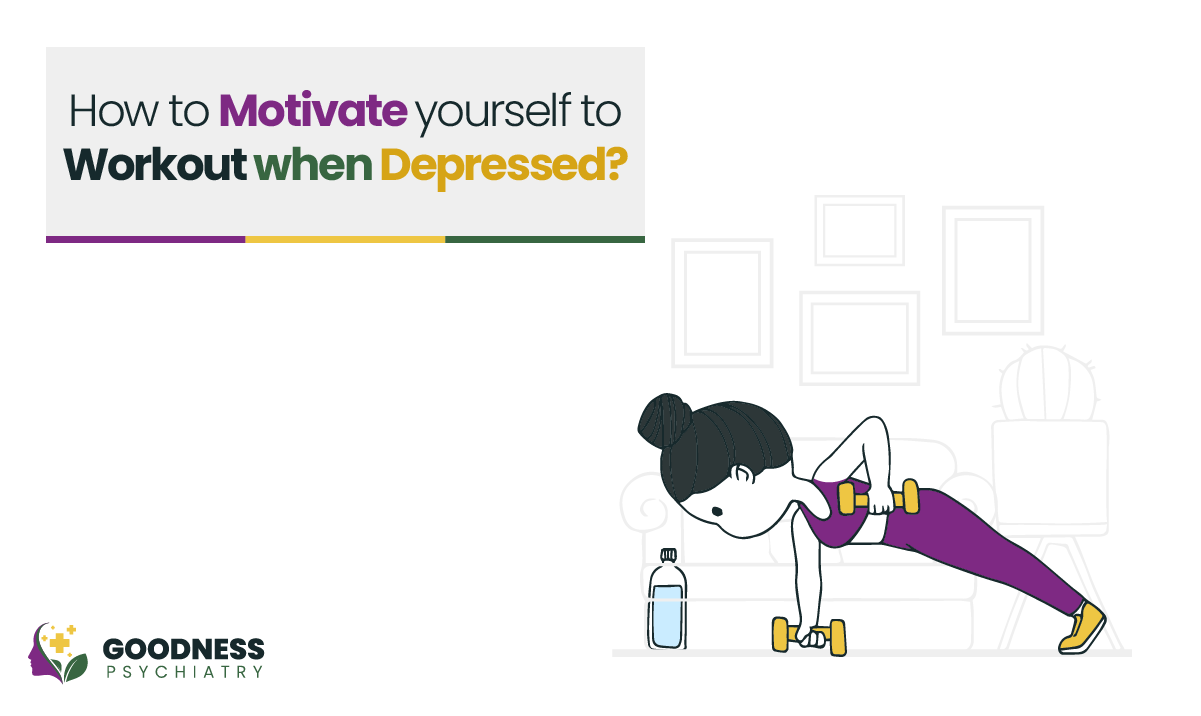How to Motivate Yourself to Work Out When Depressed? Having depression can make it hard to get up and work out. Don’t worry a lot of people face the same problem. Keep in mind that any movement is better than none at all and that every step you take counts. We have put together a list of ways to get motivated to work out even when you’re feeling down. It’s possible.
How Depression Affects Workout Motivation
People who are depressed may have less motivation to exercise. There are numerous indications that someone is depressed, according to the National Institute of Mental Health. For instance, persistent melancholy, anxiety, or empty feelings such as irritation, frustration, restlessness, feeling stuck or guilty, feeling exhausted, or lack of energy. Other indications may include:
- Experiencing difficulty falling asleep
- Difficulty in concentration
- Paying attention
- Making decisions
- Changes in appetite or weight
- Discomfort in the body or digestive problems
- Loss of interest or enjoyment in activities
These and other depressive symptoms might make it difficult to begin or maintain exercise fitness.
Exercise can help improve and even lessen the symptoms of depression, even though depression itself can negatively impact one’s motivation to stay healthy. A physician may advise exercising alone or with other therapies.
How to Get Motivated to Exercise When Depressed?
Tips for Getting Motivated to Work Out When You’re Sad
Accept How You Feel
Know that being sad can make it hard to get things done. Remember that it’s okay to feel this way and that little steps can add up to big changes.
Make Small Goals that You Can Reach
Begin with easy-to-achieve goals. Focus on short workouts, like a 5-minute walk or some light stretching. These small goals can help you feel better about yourself and give you more drive.
Do Things You Enjoy
Look for activities that you enjoy. Doing things you enjoy, like yoga, dancing, or swimming, can make working out feel less like a chore.
Make a Schedule
Make working out a regular habit. Building a habit through consistency can help you stick to your exercise goals even on days when things get tough.
Ask for Help
You could talk to family, friends, or a mental health expert. Having someone to hold you accountable and give you support can help you stay inspired.
Be Kind to Yourself
Do something good for you. Go with the flow, even if it’s slow. Celebrate your wins, no matter how big or small, and don’t be too hard on yourself.
Use Technology to Help You
Consider using workout apps or online videos. They can help you mix up and plan your exercises, making them more fun and doable.
Enjoy the Outdoors
If possible, exercise outside. It can enhance your mood, reduce stress, and make your workouts more enjoyable.
Remember the Benefits
Exercise is not just about physical health, it boosts your mental health too. It increases endorphins, making you feel happier and reducing sadness.
Be Mindful
Be aware during your workouts. Notice how you feel, your actions, and your breath. It helps you present and reduce negative thoughts.
Reward Yourself
Plan treats when you hit workout goals. Enjoy a movie, snack on a favorite treat, or relax in a bath.
Get Support
If you find it hard to start, consider seeking help from a workout coach or therapist. They can offer personalized advice and encouragement.
Goodness Psychiatry can help you overcome depression and create great life changes.
Wrapping Up
How to motivate yourself to work out when depressed?
Finding exercise inspiration during depression periods might be challenging, but it’s always within reach.
Establish minor objectives, ask for help, and treat yourself with consideration. You can incorporate fitness into your daily routine. Remember that every step, no matter how small, counts and even modest efforts significantly improve mental and physical well-being.
FAQs
How to motivate yourself when depressed?
Try getting at least 30 minutes of moderate workouts most days. Remember, however, that all sorts of physical activity help.
What if I don’t enjoy traditional forms of exercise?
That’s okay! Find fun alternatives like dancing, swimming, or yoga. The aim is to stay active in a way that suits you.
Can exercise improve my mood?
Indeed! Exercises increase endorphins, lifts mood, and lessens depression symptoms.
What should I do if I miss a workout?
Don’t fret or talk yourself down. Look forward to your next exercise stint, every step matters.
Is it better to exercise alone or with others?
It depends on your preference. Some people find exercising with others more motivating, while others prefer solo workouts. Choose what works best for you.

